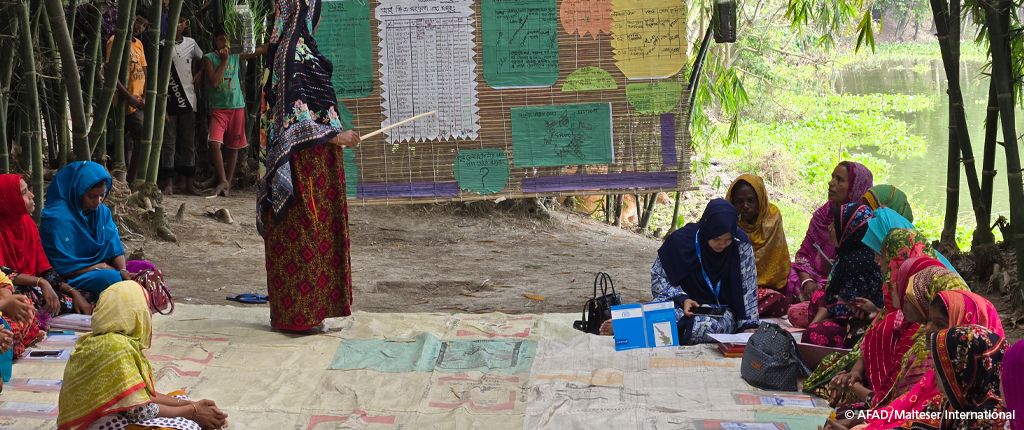
Strengthening resilience of vulnerable communities in Northern, Western, and Eastern Bangladesh
In collaboration with four close partner organizations - AFAD, CDD, Mukti Foundation and PHALS - Malteser International is committed to strengthening the resilience of particularly vulnerable households against the impacts of climate change. Our project includes activities such as community organization, advocacy, the development of alternative livelihoods, and localization efforts. A special focus is placed on the inclusion of people with disabilities in disaster risk reduction measures (DiDRR).
The project is being implemented in four disaster-prone districts of Bangladesh: Kurigram in the north, Satkhira and Bagerhat in the west, and Cox's Bazar in the southeast. These areas are heavily affected by the impacts of climate change, such as floods, cyclones, and rising sea levels. Livelihood protection measures are therefore designed to create sustainable options adapted to the local context, especially for highly marginalized individuals.
Hence, this project contributes to the Sustainable Development Goals (SDGs). It contributes to reducing poverty (SDG 1), promoting gender equality (SDG 5), reducing social inequalities (SDG 10), fostering sustainable production and consumption (SDG 12), and advancing climate action (SDG 13). Additionally, the project works closely with local partners – including research institutions, businesses, civil society organizations, and communities – to build partnerships for sustainability (SDG 17).
Bangladesh is one of the poorest countries in the world and is heavily affected by climate change. With over 700 km of coastline, it is particularly vulnerable to rising sea levels. Additionally, it has one of the highest population densities globally, which continues to grow rapidly.
Due to unpredictable weather conditions and flooding, the livelihoods of the predominantly agricultural villages have become extremely precarious. Families dependent on seasonal harvests lack sufficient alternative income sources, leading to debt and migration to already overcrowded urban centers.
The economic impacts of climate change are most severe for marginalized groups, particularly rural women, widows, people with disabilities, transgender individuals, and the landless, including Hindu Dalits and other minority groups such as the Munda. They have little access to support and often suffer from social and structural exclusion.
The aim of the project is to reduce the vulnerability of disadvantaged rural riverine and coastal communities in Bangladesh by improving their socio-economic conditions and strengthening emergency preparedness.
- Development of alternative livelihoods, including business plans, market linkages, provision of tools, equipment and materials for marginalized communities
- Collaboration with universities, colleges and agriculture departments through our partner organizations
- Conducting awareness-raising and advocacy activities with local stakeholders, government officials and communities
- Formation and training of self-reliant groups that strengthen local cooperation, mutual support and ownership of the project
- Establishment of a seed and food bank within the self-reliant groups
- Needs-based training on alternative livelihood activities, advocacy, and Disability-inclusive Disaster Risk Reduction (DiDRR)
- Community development projects, including tree planting initiatives
Country info
Capital: Dhaka
Area: 147.570 km²
Population: approx. 174 million
Project data
Project duration: since November 2022
Financing: Federal Ministry for Economic Cooperation and Development (BMZ), The German Relief Coalition (Aktion Deutschland Hilft - ADH)
Partner: Association for Alternative Development (AFAD), Centre for Disability in Development, Mukti Foundation und Programme for Helpless and Lagged Societies (PHALS)








